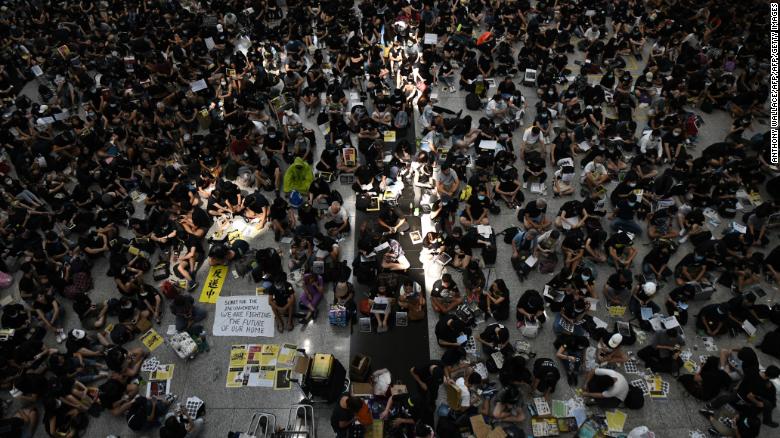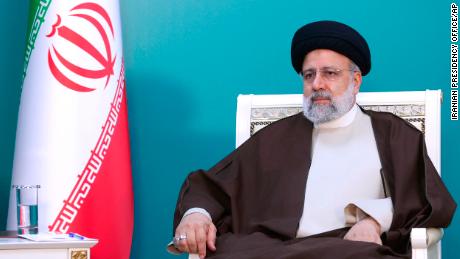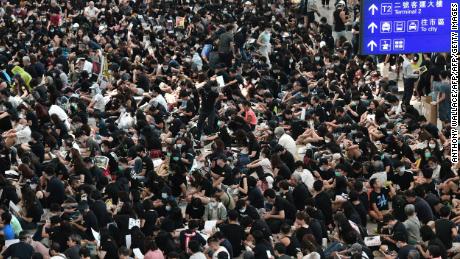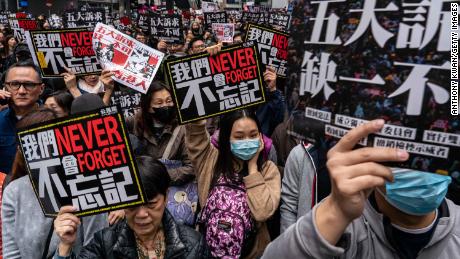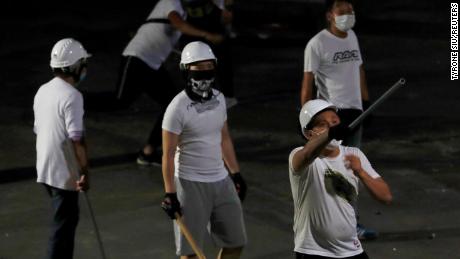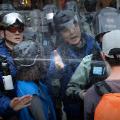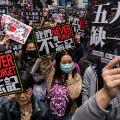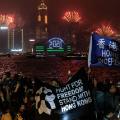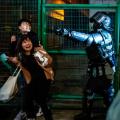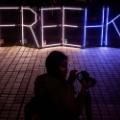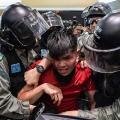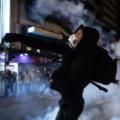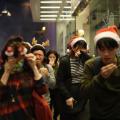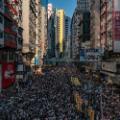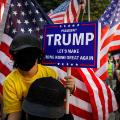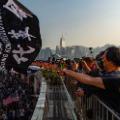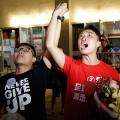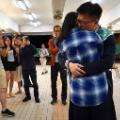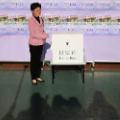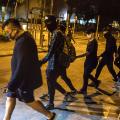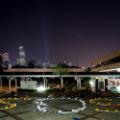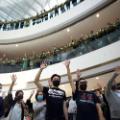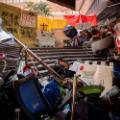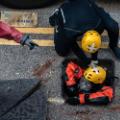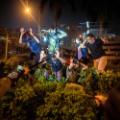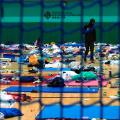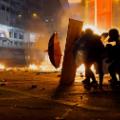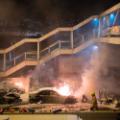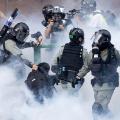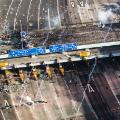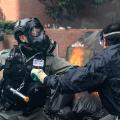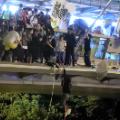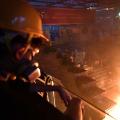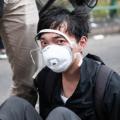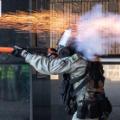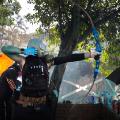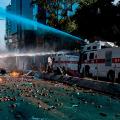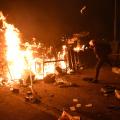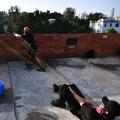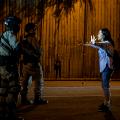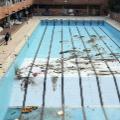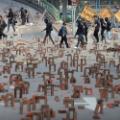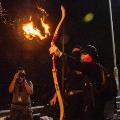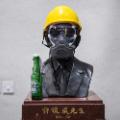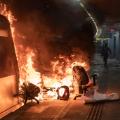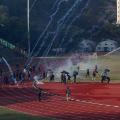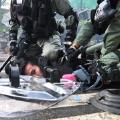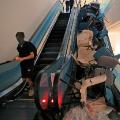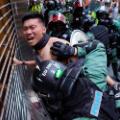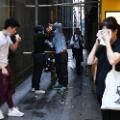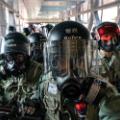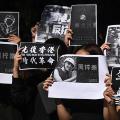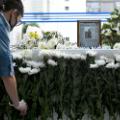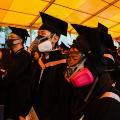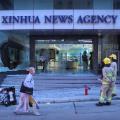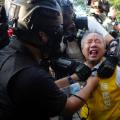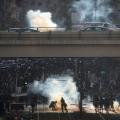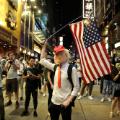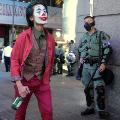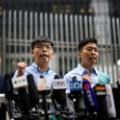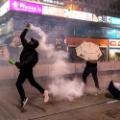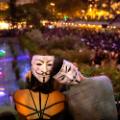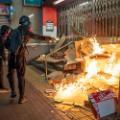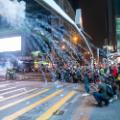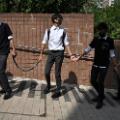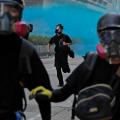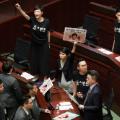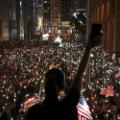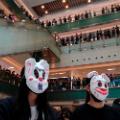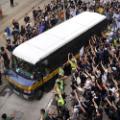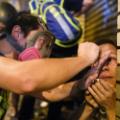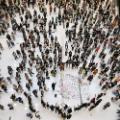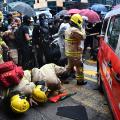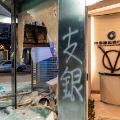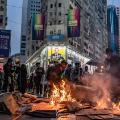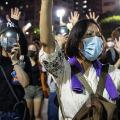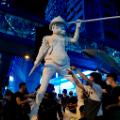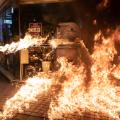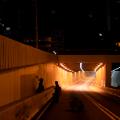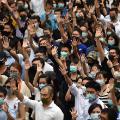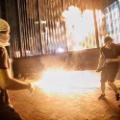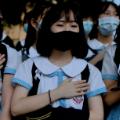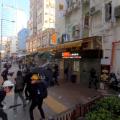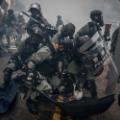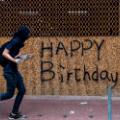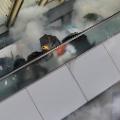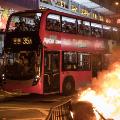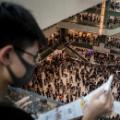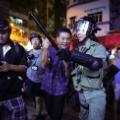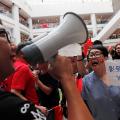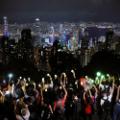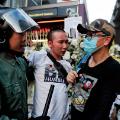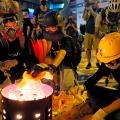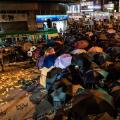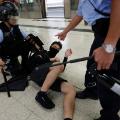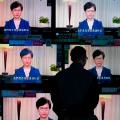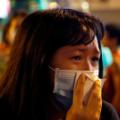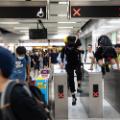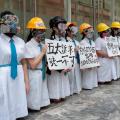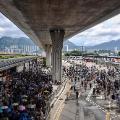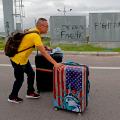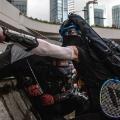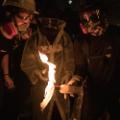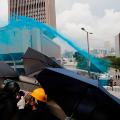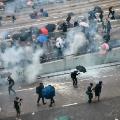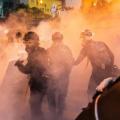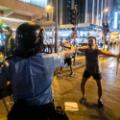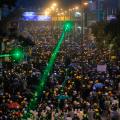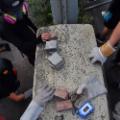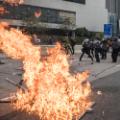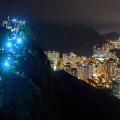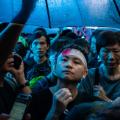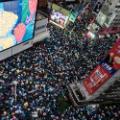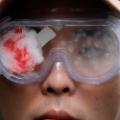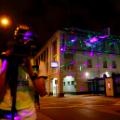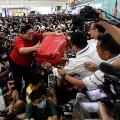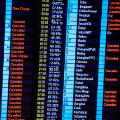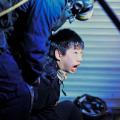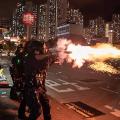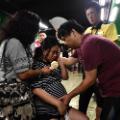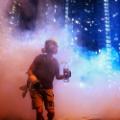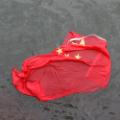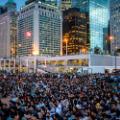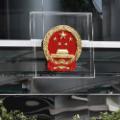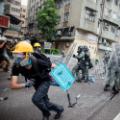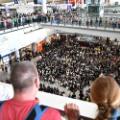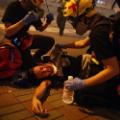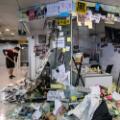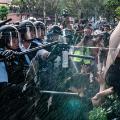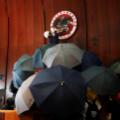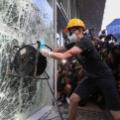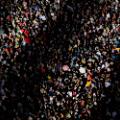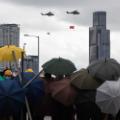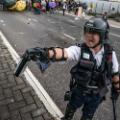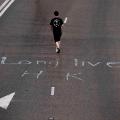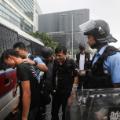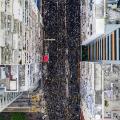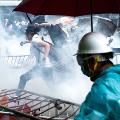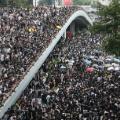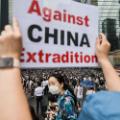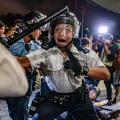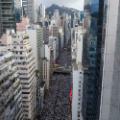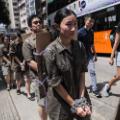Hong Kong (CNN)Thousands of demonstrators continued what is intended to be a peaceful three-day sit-in at Hong Kong's international airport on Saturday, while police used tear gas on protesters at two other sites in the city. This is the 10th straight weekend of protests throughout the financial hub.
Police used tear gas to disperse a group who barricaded a roundabout in Tai Wai, according to a government press release. They used tear gas for a second time on Saturday evening after demonstrators began starting fires outside the Tsim Sha Tsui police station, which was also vandalized last weekend, according to the release.
Another group of demonstrators blocked the Kowloon entrance to the Cross-Harbour Tunnel, which connects the Kowloon Peninsula to Hong Kong Island.
The airport sit-in, in the arrivals hall of the main terminal, has not disrupted operations so far. Earlier, Hong Kong's flagship airline Cathay Pacific said some flights to China had been canceled due to Typhoon Lekima, which prompted the evacuation of more than 1 million people in the eastern province of Zhejiang.
Chanting "Hong Kong people, add oil" -- an expression used to express support and encouragement -- protesters started gathering at the airport from midday Friday.
The move is the latest challenge to the government's apparent strategy of waiting out the ongoing political crisis and comes just days after a citywide strike shut down flights and trains, causing travel chaos.
Protesters held signs in English and Chinese and had printed leaflets in multiple languages explaining the causes and demands of the demonstrations for arriving tourists.
Hong Kong's airport is one of the busiest in the world, handling 1,100 passenger and cargo flights daily, with services between the city and about 200 international destinations.
In a statement, the city's Airport Authority said that additional security would be deployed on site Friday to assist passengers and airport staff. In order to minimize disruption to flights, only departing passengers with valid tickets or boarding passes and travel documents would be allowed to enter to the check-in aisles at Terminal 1, said the statement.
China bans Cathay Pacific staff involved in protests
On Thursday, China issued a ban on Cathay Pacific staff who have supported and participated in the protests, according to a statement published on China's Civil Aviation Administration's website.
It said that from midnight on Saturday, the airline "must stop all those who have participated in and those who support the illegal demonstrations, protests and violent attacks, as well as those who have had radical behaviors, from executing all flights to and from the mainland."
New rules will also be implemented from Sunday that require the airline to "submit the ID information of all crew members flying to the mainland and flying over the mainland air space to the relevant mainland authorities for approval."
"Cathay flights will not be accepted without getting the approval," the statement added.
In response, Cathay told CNN in a statement that it was treating China's directive "seriously" and was studying it very carefully.
"The safety of our passengers is always the top priority of Cathay Pacific. There is zero tolerance to any inappropriate and unprofessional behavior that may affect aviation safety. We deal with these incidents very seriously," the airline's statement added.
Cathay's CEO, Rupert Hogg, confirmed in a message to employees Saturday that the airline would cooperate with the Chinese ban. Employees who "support or take part in illegal protests, violent actions, or overly radical behavior" will be banned from working on flights or any related activities to mainland China, Hogg said.
Cathay also said in a press release Saturday that a pilot charged with rioting in Hong Kong had been removed from "flying duties," while two airport ground staff were fired for "misconduct."
US issues travel warning
On Thursday, the United States became the latest country to issue a travel warning for Hong Kong, urging travelers to exercise increased caution over the protests.
"Most have been peaceful, but some have turned confrontational or resulted in violent clashes," the advisory said. "These demonstrations, which can take place with little or no notice, are likely to continue."
Similar warnings have been issued by other countries including Australia, the United Kingdom, Ireland, Japan and Singapore. Although the warnings recommend travelers exercise a high degree of caution, countries are not yet advising visitors to avoid Hong Kong altogether.
"Hong Kong remains a welcoming city for tourists and travelers from around the world," a Hong Kong government spokesman said in a statement. "The impact of these illegal confrontations is confined to a limited area near the procession routes, and is not widespread."
Additional protests were planned for this weekend, including in the northern New Territories town of Tai Po and in Sham Shui Po, in Kowloon, where police fired tear gas in clashes with protesters earlier this week. As of Friday afternoon, police had refused to issue letters of no objection for the planned protests on Saturday and Sunday respectively, meaning they could be deemed illegal assemblies.
Growing frustration
Both the Hong Kong government and protesters are engaged in an apparent war of attrition, with neither side willing to budge as protests became increasingly violent and the mood in the city turns darker.
Some people have reacted negatively as protests have spilled over from traditional demonstration targets in the city's central business district to more residential areas. Clashes have taken place between alleged triad gang members and mostly young protesters in some areas, and police tear gas fired to clear occupied roads has seeped into nearby apartments, putting vulnerable bystanders at risk.
Smaller-scale demonstrations in support of the Hong Kong government and police have also been held, with another planned for this weekend.
Speaking this week, one of China's top officials responsible for Hong Kong appeared to seek to capitalize on the growing divides and frustrations within the city, dividing the protest movement into two groups.
"At the front are a small number of violent radicals; in the middle are some kind-hearted citizens who have been misguided and coerced to join," said Yang Guang, spokesman for the Hong Kong and Macau Affairs Office.
Speaking to reporters, Yang emphasized the economic and societal damage caused to Hong Kong by the protests and urged citizens to "stand firm and guard our beautiful homeland."
"Let's do as a loving mother does to take the inexplicably angry child home," he said, adding that the protests had gone way beyond the freedom of assembly and expression that Hong Kong is permitted.
Waiting game
During the 2014 Umbrella Movement, when tens of thousands of pro-democracy protesters occupied parts of the city for several months, the local government and police took a hands off approach, watching as the mood in some areas turned against the movement as it became increasingly disruptive to local businesses and general life.
That appears to be the current strategy as well, combined with hardline policing of any violent protests, and increased arrests of alleged ringleaders. Almost 600 people have been arrested so far, police said this week, for a range of offenses including "taking part in a riot," unlawful assembly, assaulting police officers, resisting arrest and possession of offensive weapons.
Speaking to CNN this week, a senior Hong Kong government official suggested the intention was to wait the protests out, saying that numbers and enthusiasm were shrinking as the demonstrations became increasingly disruptive.
The official said there was no chance of the government responding to protesters' demands, including a full withdrawal of a now-suspended extradition law which kicked off the current crisis and the resignation of Chief Executive Carrie Lam.
On whether China's military would be deployed to Hong Kong to deal with the protests, the official said that there was no intention by the local or Chinese government to do so at this time.
"We know the consequences," the official said, adding that Hong Kong police were capable of dealing with the increasing violent protests. However, he added that some protesters were risking such a reaction with provocative actions targeting China's offices in the city and the national flag.
"This is very dangerous," the official said.
Earlier this week, Yang, the Chinese official, said protesters should not "mistake our restraint for weakness."
"We would like to make it clear to the very small group of unscrupulous and violent criminals and the dirty forces behind them -- those who play with fire will perish by it," Yang said.
